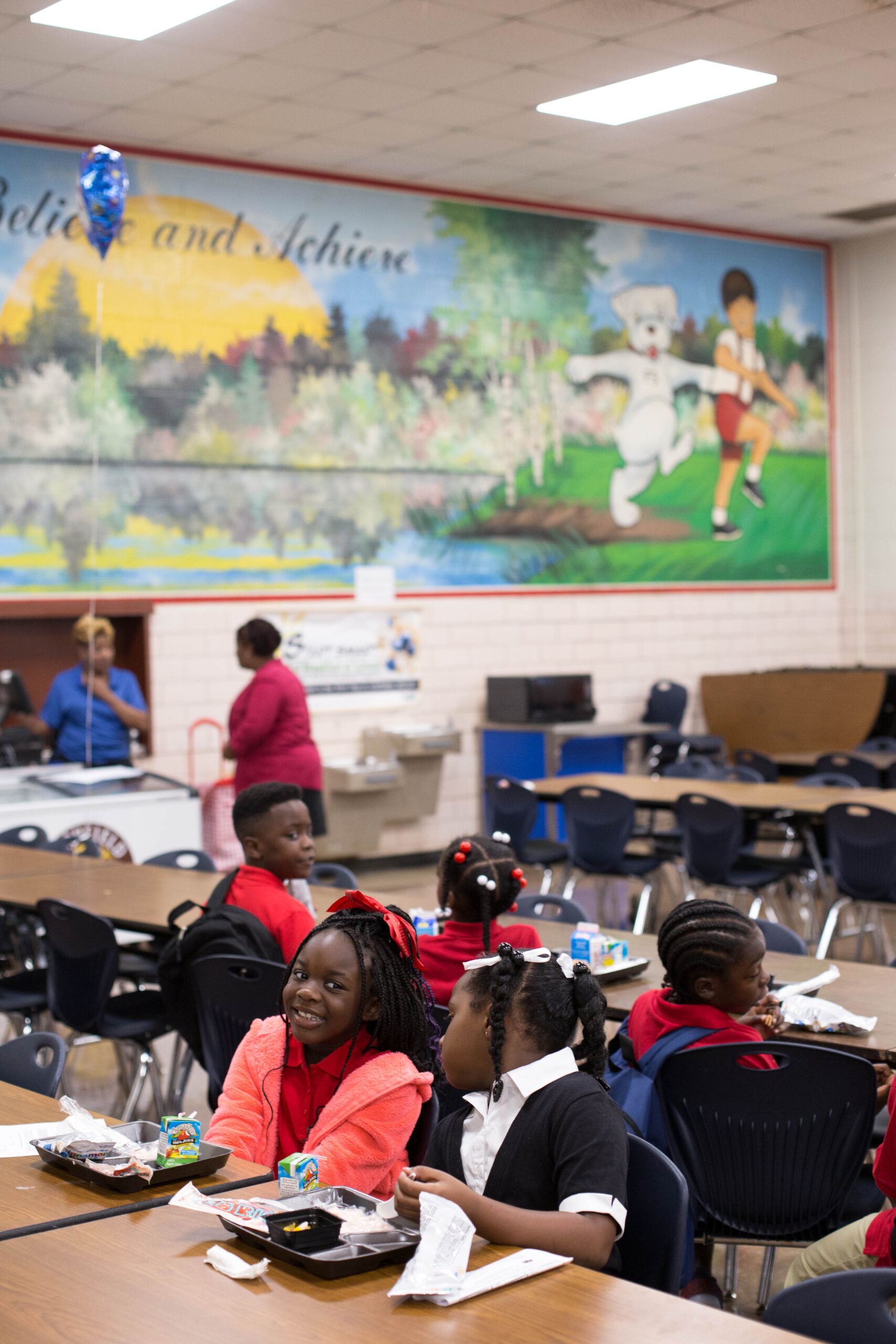Flat Shoals Teachers Aim To Overcome Out-Of-Classroom Deficits

Flat Shoals students eat breakfast in the cafeteria before the school day begins. All students here are eligible to receive free meals through the National School Lunch Program.
Ian Palmer / WABE
There’s been a lot of talk in Georgia political circles about ‘turning around’ low-performing schools. Earlier this year, the Legislature passed ‘The First Priority Act,’ a plan meant to help those schools improve.
Parts of the plan are still taking shape. Lawmakers agree there’s no ‘one size fits all’ solution to help struggling schools.
Teachers say it’s not easy, especially when kids come to school behind. But at Flat Shoals Elementary School, in Southwest DeKalb County, teachers are determined to help their students progress.
Ready Or Not?
Most of the 600 kids at Flat Shoals come from impoverished households. They may come to school hungry or without school supplies. They might be dealing with turmoil at home that they carry that to school.
“A lot of abuse is going on, parental disagreements, that kind of thing,” says school counselor Tina Johnson. She says some kids come to school upset. She counsels them and tries to get them to settle down before class begins.
Like most Flat Shoals teachers, Justin Phillips is well aware that his fourth graders may bring their problems to school. So, he checks in with each of them first thing in the morning. Phillips takes attendance by having his students stand behind their desks, state their names, and say either, “Ready to Learn” or “Not Ready to Learn.”
“If you’re not ready to learn, it’s not that they’re in trouble,” Phillips says. “I don’t want them to think it, and I tell them that. What I want them to do is, you’re not ready to learn, ok, but you’re here. That’s the first part. You’re actually here.”
If a child says he’s ‘not ready to learn,’ Phillips doesn’t judge. He follows up with a one-on-one conference, like he did with a male student recently.
“I said, ‘Ok,’ pulled him outside after we got done with instruction, and just found out that the power went out because there was a storm the other day, so he had to get dressed in the dark,” Phillips says.
Trauma With A Little ‘T’
Flat Shoals teachers know how to look out for stresses like these because every teacher goes through trauma training the week before school starts. Licensed therapist Emily Andersen leads the session. She asks teachers to name different kinds of trauma. Teachers name big events—accidents, abuse, death of a loved one.
Andersen calls those ‘big T traumas.’ They usually happen once, and can alter the course of your life, she says.
“But there are also these things called Little ‘t’ traumas, and that can be any kind of negative experience that brings you pain, that alters your reality,” Andersen says.
Kids are more likely to experience these ‘little ts,’ like coming to school hungry, on a regular basis, Andersen says. All students at Flat Shoals can receive free school meals.
But Andersen says even a free breakfast or lunch could trigger trauma if it’s the only good meal a child eats all day.
“Because they’re going to get a handful of cereal for dinner maybe,” she says.
Research shows trauma can change children’s brains and affect their ability to learn. That’s one reason why Justin Phillips asks his kids to say whether they’re ‘ready to learn.’
“It kind of lets me know how their day is starting off,” he says.
Once he understands that, then, and only then, can he teach, Phillips says.
This story is part one of three exploring how teachers at Flat Shoals are trying to help their kids beat the odds. Part two will focus on strategies teachers use to reach kids on different levels.
Correction: This report has been updated with the correct spelling of Emily Andersen, the licensed therapist who leads trauma training for Flat Shoals Elementary teachers.








